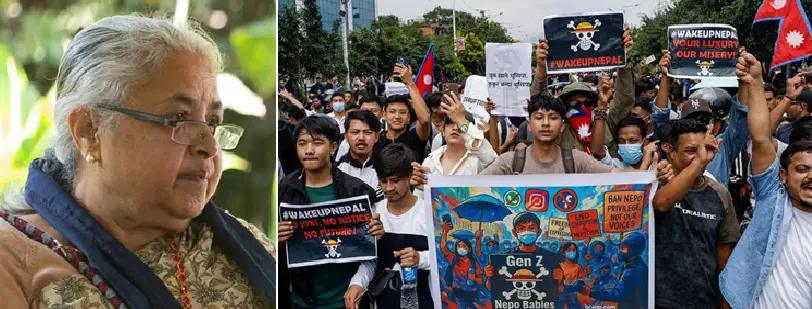
Nepal Gen Z backs Sushila Karki for interim PM after deadly protests. Discover her clean record, India ties, and why youth see her as a symbol of hope
From Protest to Power: Why Gen Z Wants Sushila Karki to Lead Nepal’s Future – Nepal is witnessing a historic moment. After days of intense youth-led protests, the death toll has tragically climbed to 30. But amid the chaos, a surprising figure has emerged as the face of hope and transition: Sushila Karki, Nepal’s first female Chief Justice. Gen Z protesters, frustrated by corruption, censorship, and political stagnation, have rallied behind her as their choice to head an interim government.
Who is Sushila Karki? Why does she resonate with Nepal’s youth? And what does her India connection mean for regional diplomacy? Let’s explore.
1. Gen Z’s Uprising: Why Nepal’s Youth Took to the Streets
Nepal’s Gen Z movement didn’t erupt overnight. It was triggered by a controversial government decision to ban 27 social media platforms- including Facebook, Instagram, and YouTube- under the pretext of national security. But for young Nepalis, this was the final straw.
What Sparked the Protests?
- The social media ban was seen as an attempt to silence dissent.
- Widespread frustration over corruption, nepotism, and unemployment had been simmering for months.
- The youth-led protests quickly escalated, with clashes between demonstrators and police.
- Parliament buildings and homes of top leaders were torched.
- Prime Minister KP Sharma Oli resigned under pressure, and the army imposed a nationwide curfew.
The Toll So Far
- 30 people have died.
- Over 1,000 injured.
- Kathmandu’s airport was shut down.
- The country remains under tight military control.
But amid the grief and anger, Gen Z protesters found unity in one name: Sushila Karki.
2. Who Is Sushila Karki? The Woman Behind the Movement
Sushila Karki isn’t a politician. She’s a jurist, a reformer, and a symbol of integrity. Born in Biratnagar in 1952, she rose through Nepal’s legal ranks to become the country’s first female Chief Justice in 2016.
Her Career Highlights
- Began legal career in 1979.
- Became senior advocate in 2007.
- Appointed Supreme Court judge in 2009; permanent judge in 2010.
- Served as Chief Justice from July 2016 to June 2017.
- Known for her zero-tolerance stance on corruption.
During her tenure, Karki delivered bold verdicts that challenged powerful figures, including the controversial removal of Nepal’s anti-corruption chief. Her fearless decisions earned her both admiration and political backlash. In 2017, she was briefly suspended after an impeachment motion was filed against her by ruling parties.
Why Gen Z Trusts Her
- She’s not affiliated with any political party.
- Her record shows independence and integrity.
- She’s viewed as a clean slate, someone who can restore trust in governance.
- Gen Z leaders say she was chosen through a virtual consensus meeting.
Karki herself acknowledged the youth’s support: “The girls and boys have chosen me. I am prepared to take on the role,” she said in a recent interview.
3. Her India Connection: Education, Sentiment, and Diplomacy
Sushila Karki’s ties to India run deep and personal. She completed her master’s degree in political science from Banaras Hindu University (BHU) in 1975 and still fondly remembers her time there.
Her Indian Roots
- Studied at BHU, Varanasi.
- Remembers sleeping on the hostel terrace beside the Ganga.
- Speaks fluent Hindi.
- Grew up in Biratnagar, just 25 miles from the Indian border.
What She Said About India
In a recent interview, Karki expressed warm sentiments toward India and Prime Minister Narendra Modi:
“I greet Modi ji. I have a good impression about Modi ji. We consider Indian leaders as our own brothers and sisters,” she said.
She emphasized the strong people-to-people ties between the two nations, even while acknowledging that government-to-government relations can be complex:
“When utensils are kept together in the kitchen, they do make some sound. It happens,” she added, using a Hindi proverb to describe occasional friction.
Assurances to Indians in Nepal
Karki also assured that Indians living in Nepal are safe and that law and order is being restored. She promised justice for the families of those who died in the protests.
4. What’s Next for Nepal? Challenges and Hopes Ahead
If appointed, Sushila Karki will face enormous challenges. Nepal is still reeling from violence, and the political vacuum is deep. But her leadership could offer a rare moment of unity.
Her Priorities
- Honor the youth who died in the protests.
- Restore law and order.
- Build a transparent interim government.
- Prepare for fresh elections.
- Rebuild trust in public institutions.
Why Her Appointment Matters
- It signals a shift from dynastic politics to merit-based leadership.
- It reflects Gen Z’s demand for ethical governance.
- It could redefine Nepal’s relationship with India and other neighbors.
Regional Implications
India will be watching closely. Karki’s warm remarks and personal ties could help reset bilateral relations. Her legal background may also bring a more structured approach to diplomacy.
Final Thoughts: A Judge for the People, Chosen by the Youth
Sushila Karki’s rise from courtroom to potential prime ministership is more than symbolic, it’s revolutionary. In a country shaken by grief and anger, her name represents hope, justice, and a fresh start. Gen Z’s choice isn’t just about rejecting the old guard, it’s about rewriting the rules.
Whether she succeeds or not, one thing is clear: Nepal’s youth have found their voice. And they’ve chosen a leader who listens.
Stay informed with the latest news and updates – only on Rapido Updates.
4 thoughts on “Fearless & Chosen: Why Gen Z Wants Sushila Karki to Lead Nepal’s Future”
Comments are closed.